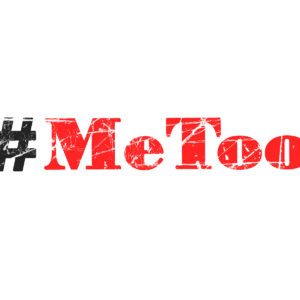Editor’s Note: For an alternative viewpoint, please see: Counterpoint: From ‘Me Too’ to ‘Not One More’
This fall the #MeToo movement sought to highlight the ubiquity of sexual mistreatment by encouraging victims, mostly women, to speak up. Some women shared harrowing accounts of violent assault. Others recounted workplace harassment or unfairness. Still others, perhaps unready to share details of their experiences, simply posted the hashtag “MeToo” on social media.
No victim of sexual assault or harassment should suffer in silence. Violations of this kind should never be tolerated, and we can celebrate that the proverbial opening of the floodgates might help victims find solidarity and cope with their experiences, and ultimately, increased attention to this issue could spark needed change.
However, the #MeToo movement comes with real risks, and women and men alike should take them seriously. Rather than a movement that paints these terrible interactions as commonplace, we need a different focus that fosters positive relationships between the sexes and condemns bad individual actions rather than society as a whole.
The hashtag-ization of sexual misconduct may support unfair narratives that depict all men as potential predators, or all women as potential accusers. This threatens to drive a wedge between men and women, both inside and outside of the workplace.
As Sheryl Sandberg wrote in a lengthy Facebook post, men may be inclined to respond to #MeToo by playing it overly safe: They may not want to offer mentorships to junior women staffers, for fear that an awkward interaction could lead to accusations of harassment. This could potentially have serious effects, given how in many traditionally male-dominated industries, entry-level women have few options for same-sex mentors.
It is often “soft” networking interactions, like lunch, coffee or happy hour, where co-workers develop social capital. Will #MeToo cause a de facto sexual segregation to the detriment of women? This has implications not just for the workplace, but for the romantic realm as well.
Another shortcoming of #MeToo: Lumping together all varying degrees of bad interactions — from violent assault to off-putting jokes — risks watering down the most heinous of crimes. When sexual misconduct is everywhere, it’s nowhere. We do not want anyone to shrug off sexual misconduct or see it as an unfixable problem.
Misrepresenting the prevalence or nature of inappropriate behavior can harm victims both past and future, as our current conversations shape cultural expectations for men. We should be clear that the expectations for men in our culture are high, not low: Virtue is expected. Misdeeds will be shamed.
The pendulum of social justice can swing too far. If we’ve failed to believe victims in the past, we could overcorrect and fail to honor due process for the accused in the future. Accusations of sexual assault or harassment should be taken seriously — seriously enough to be investigated and litigated.
Many accusations are true, but sadly, we’ve seen high-profile stories of assault turn out to be false (for example, the Duke lacrosse case in 2006 and the Rolling Stone “Jackie” article about University of Virginia Phi Kappa Psi fraternity in 2015). False accusations not only unfairly defame the accused but also cast a shadow of doubt on all victims. This is terribly wrong, but it is a reminder to soberly assess the facts in each case.
The #MeToo campaign carries yet one more risk, a political one: It could become co-opted by a left-leaning agenda that seeks to paint all women as victims in society. The goal of this political strategy is to confound the real abuse of individual women victims with other phenomena, from “rape culture” even to issues like the gender wage gap or a lack of government-mandated maternity leave. Those who are truly interested in combatting sexual mistreatment should guard against the politicization of their movement and the blurring of these lines.
Margaret Thatcher said, “There is no such thing as society. There are men and women, and there are families.” The focus on so-called rape culture risks moving responsibility away from individuals onto a faceless “society.” We should resist this, instead taking and placing specific individual responsibility for words and actions. In other words, it is not rape culture that is to blame, but the rapist.
As we give victims of sexual mistreatment the respect and platform they deserve, we should keep in mind the needed balance that also honors the rights of the accused. We should invite all — men, women, liberals and conservatives — to work toward a healthier future, without painting an overly dark picture of the present.

